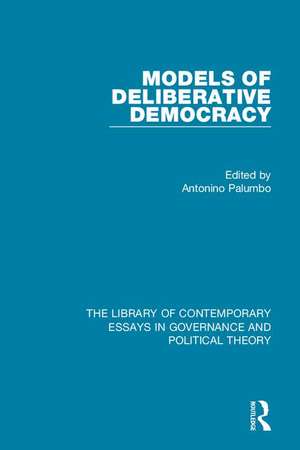Models of Deliberative Democracy: The Library of Contemporary Essays in Governance and Political Theory
Editat de Antonino Palumboen Limba Engleză Hardback – 21 iun 2017
Preț: 1589.30 lei
Preț vechi: 1746.49 lei
-9% Nou
Puncte Express: 2384
Preț estimativ în valută:
304.11€ • 331.37$ • 256.26£
304.11€ • 331.37$ • 256.26£
Carte disponibilă
Livrare economică 02-16 aprilie
Livrare express 19-25 martie pentru 40.93 lei
Preluare comenzi: 021 569.72.76
Specificații
ISBN-13: 9781472429162
ISBN-10: 1472429168
Pagini: 410
Ilustrații: 3 Tables, black and white; 7 Halftones, black and white
Dimensiuni: 156 x 234 x 29 mm
Greutate: 0.75 kg
Ediția:1
Editura: Taylor & Francis
Colecția Routledge
Seria The Library of Contemporary Essays in Governance and Political Theory
Locul publicării:Oxford, United Kingdom
ISBN-10: 1472429168
Pagini: 410
Ilustrații: 3 Tables, black and white; 7 Halftones, black and white
Dimensiuni: 156 x 234 x 29 mm
Greutate: 0.75 kg
Ediția:1
Editura: Taylor & Francis
Colecția Routledge
Seria The Library of Contemporary Essays in Governance and Political Theory
Locul publicării:Oxford, United Kingdom
Cuprins
Models of Deliberative Democracy
Library of Essays in Governance and Political Theory
Edited by Antonino Palumbo
Part 1: Epistemic Models of Deliberative Democracy
1. David Estlund, ‘The Epistemic Dimension of Democratic Authority’, The Modern Schoolman LXXIV, 1997, 259-276.
2. Amy Gutmann and Dennis Thompson, ‘What Deliberative Democracy Means’, in Why Deliberative Democracy? (Princeton University Press, 2004), pp. 1-63
3. Jurgen Habermas, ‘Political Communication in Media Society: Does Democracy Still Enjoy an Epistemic Dimension? The Impact of Normative Theory on Empirical Research’, Communication Theory 16, 2006, 411-426.
4. Philip Pettit, ‘Deliberative Democracy and the Case for Depoliticising Government’, University of New South Wales Law Journal 24, 3, 2001, 724-736.
Part 2: Integrative Models of Deliberative Democracy
5. John S. Dryzek, ‘Legitimacy and Economy in Deliberative Democracy’, Political Theory 29, 5, 2001, 651-669.
6. James S. Fishkin, ‘Making Deliberative Democracy Practical: Public Consultation and Dispute Resolution’, Ohio State Journal on Disputes Resolution 26, 4, 2011, 611-626.
7. Robert E. Goodin and John S. Dryzek, ‘Deliberative Impacts: The Macro-Political Uptake of Mini-Publics’, Politics & Society 34, 2, 2006, 219-244.
8. Hubertus Buchstein, ‘Reviving Randomness for Political Rationality: Elements of a Theory of Aleatory Democracy’, Constellations 17, 3, 2010, 435-454.
9. Noelle McAfee, ‘Three Models of Democratic Deliberation’, Journal of Speculative Philosophy 18, 1, 2004, 44-59.
10. Chantal Mouffe, ‘Deliberative Democracy or Agonistic Pluralism?’, Social Research 66, 3, 1999, 745-758.
11. Stephen Coleman, ‘New Mediation and Direct Representation: Reconceptualizing Representation in the Digital Age’, New Media & Society 7, 2, 2005, 177-198.
12. Lincoln Dahlberg, ‘The Internet, Deliberative Democracy, and Power: Radicalizing the Public Sphere’, International Journal of Media & Cultural Politics 3, 1, 2007, 47-64.
13. Joshua Cohen and Charles F. Sabel, ‘Global Democracy’, Journal of International Law & Politics 37, 2004, 763-797.
14. Mark E. Warren, ‘Governance-driven Democratization’, Critical Policy Analysis 3, 1, 2009, 3-13.
15. Archon Fung, ‘Varieties of Participation in Complex Governance’, Public Administration Review 66, S1, 2006, 66-75.
16. Frank Fischer, ‘Participatory Governance as Deliberative Empowerment: The Cultural Politics of Discursive Space’, American Review of Public Administration 36, 1, 2006, 19-40.
Library of Essays in Governance and Political Theory
Edited by Antonino Palumbo
Part 1: Epistemic Models of Deliberative Democracy
1. David Estlund, ‘The Epistemic Dimension of Democratic Authority’, The Modern Schoolman LXXIV, 1997, 259-276.
2. Amy Gutmann and Dennis Thompson, ‘What Deliberative Democracy Means’, in Why Deliberative Democracy? (Princeton University Press, 2004), pp. 1-63
3. Jurgen Habermas, ‘Political Communication in Media Society: Does Democracy Still Enjoy an Epistemic Dimension? The Impact of Normative Theory on Empirical Research’, Communication Theory 16, 2006, 411-426.
4. Philip Pettit, ‘Deliberative Democracy and the Case for Depoliticising Government’, University of New South Wales Law Journal 24, 3, 2001, 724-736.
Part 2: Integrative Models of Deliberative Democracy
5. John S. Dryzek, ‘Legitimacy and Economy in Deliberative Democracy’, Political Theory 29, 5, 2001, 651-669.
6. James S. Fishkin, ‘Making Deliberative Democracy Practical: Public Consultation and Dispute Resolution’, Ohio State Journal on Disputes Resolution 26, 4, 2011, 611-626.
7. Robert E. Goodin and John S. Dryzek, ‘Deliberative Impacts: The Macro-Political Uptake of Mini-Publics’, Politics & Society 34, 2, 2006, 219-244.
8. Hubertus Buchstein, ‘Reviving Randomness for Political Rationality: Elements of a Theory of Aleatory Democracy’, Constellations 17, 3, 2010, 435-454.
9. Noelle McAfee, ‘Three Models of Democratic Deliberation’, Journal of Speculative Philosophy 18, 1, 2004, 44-59.
10. Chantal Mouffe, ‘Deliberative Democracy or Agonistic Pluralism?’, Social Research 66, 3, 1999, 745-758.
11. Stephen Coleman, ‘New Mediation and Direct Representation: Reconceptualizing Representation in the Digital Age’, New Media & Society 7, 2, 2005, 177-198.
12. Lincoln Dahlberg, ‘The Internet, Deliberative Democracy, and Power: Radicalizing the Public Sphere’, International Journal of Media & Cultural Politics 3, 1, 2007, 47-64.
13. Joshua Cohen and Charles F. Sabel, ‘Global Democracy’, Journal of International Law & Politics 37, 2004, 763-797.
14. Mark E. Warren, ‘Governance-driven Democratization’, Critical Policy Analysis 3, 1, 2009, 3-13.
15. Archon Fung, ‘Varieties of Participation in Complex Governance’, Public Administration Review 66, S1, 2006, 66-75.
16. Frank Fischer, ‘Participatory Governance as Deliberative Empowerment: The Cultural Politics of Discursive Space’, American Review of Public Administration 36, 1, 2006, 19-40.
Descriere
This collection of landmark essays attempts to explain how deliberation is contributing to the democratisation of policy making and policy implementation, fields which in the past were reserved to restricted professional groups having the right expertise.



